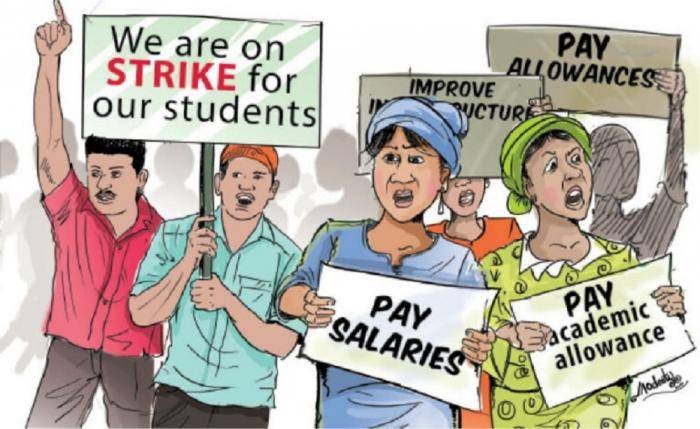
Public university lecturers have been on strike for five months with no sign of a resolution to the crisis.
But the Joint Admissions and Matriculation Board has added a new twist to the case, with its commencement of sale of forms to candidates seeking admission into tertiary institutions next year.
This is happening when most universities are yet to conclude their admission process for the 2013/2014 academic year, while others are still in the process of registration.
Therefore, some Nigerians have questioned JAMB’s decision when a set of fresh students are still awaiting their first lectures at the affected universities.
Ms. Taiwo Ogunyale and her fellow freshers are one week into their registration at the University of Lagos, Akoka. Ogunyale, who was admitted to study Microbiology, criticised JAMB’s sale of new forms, saying it could lead to a backlog of candidates awaiting admission into universities.
“Selling forms at this time when universities are still on strike is not that good. So I don’t think it will help matters because most universities are not ready to admit new students. It will only lead to a backlog,” she said.
In 2013, a total of 1,503,931 candidates sat for JAMB’s Unified Tertiary Matriculation Examinations. In the previous year, 1,493,604 candidates sat for the examination.
Meanwhile, it is expected that at least, 1,500,000 candidates would sit for the examination slated for April 2014.
Considering the sheer size of candidates sitting for the examination annually, many identified the expected financial gains as a major factor responsible for JAMB’s decision.
For instance, Mr. Oluwatobi Tijani, another fresher, recalled buying form for the 2013 examination for N5,000. With that in mind, Tijani concluded that JAMB must be after the proceeds from the sale of the forms.
He said, “JAMB is just using it (sale of forms) to make money from candidates. I heard some candidates even paid up to N20,000 for late collection of forms last year, so they are just exploiting us.
“I expected JAMB to liaise with the schools and the lecturers and this might require holding on for a while to see how things would turn out before selling fresh forms.”
At N5,000 on each candidate that sat for examination early this year, JAMB raked in about N7.5bn revenue from form sales alone.
A parent, Mr. Akin Ogunduyile, also described the sale of forms as capable of compounding the ongoing crisis in the education sector.
According to Ogunduyile, there is currently an overwhelming pressure on facilities in the universities, even without new admissions.
He said, “There is a problem already. The universities are not through with one set and they are trying to take another, while they are crying that there are no facilities. The strike has already affected the system, so I don’t know how they want to accommodate them.
“I look at it as if they are only interested in the money they want to make from the forms. I don’t think they are interested in giving our children qualitative education as long as the cash flows in.”
He, however, appealed to the Federal Government to expand and improve on the facilities of public universities across the country.
Another parent, Mr. Mike Ananigie, who described the situation as “embarrassing”, blamed it on the lack of organisation in the country.
Ananigie said, “JAMB should have liaised with the appropriate authorities. They can afford to hold on for a while to restructure the education system and the school calendar. But I think the disconnect was because of lack of organisation.”
Earlier this year, the former Minister of Education, Prof. Ruqayyatu Rufai, explained the shortage of infrastructure in the universities.
For instance, Rufai said UNILAG had the facilities to admit only 6,000 out of the 99,165 applications it received for the 2011/2012 admission year.
A PhD student of Guidance and Counselling for Educational Foundations, UNILAG, Mr. Ayodeji Olawole, who agreed that JAMB’s decision might have financial inclination, however, added that the situation would have little effect on the country’s university education system.
Olawole said the processing and registration of UTME forms usually take candidates some time to conclude, adding that students would only be required to wait at home for some time should the situation lead to a backlog.
He said, “It does not disturb anything since the final year students would sit for their final examinations the moment the strike is called off.
“And also, the candidates buying the new forms will have to do registration, sit for the examination and wait for their results before they start processing their admissions; so all of these take time.
“Although, JAMB might be thinking of the money they will make from the sale of forms since they already have a budget for the year, I think the worst that can happen is for students to sit at home for a while if there is a backlog.”
Also, Prof. ‘Supo Jegede of the Department of Adult Education, UNILAG, said it would not have much effect on the education system except to add to lecturers’ workload.
Jegede said, “I don’t see anything wrong with it (sale of forms). Lecturers might probably do extension work. That will mean that we can’t go for holidays and that is not a problem, after all, we’ve been at home resting for some time now due to the strike.
“In addition, university work is a different type of work; lecturers can schedule their work in a way that it will suit them. We should also consider that some candidates will not buy forms early and then the private universities and other institutions that are not on strike are also there to use the forms.”
According to a statement issued in Abuja by JAMB’s spokesman, Fabian Benjamin, earlier in November, the early sale of the application forms is to enable candidates desirous of tertiary education to have access to the forms so that they could prepare ahead for the examination. The forms officially sell for N4,000 each, lower than its price the previous year.
Benjamin defended JAMB’s decision to sell forms in spite of the ongoing strike action in public universities, saying the examination was not meant for the affected universities alone.
He said, “We conduct examination for the entire tertiary institutions in Nigeria including private universities, polytechnics and colleges of education, so it’s not just for public universities. Other tertiary institutions constitute almost 70 per cent of the people that the examinations serve. Also, some of the schools have almost finished their sessions, but we can’t wait till all the schools are ready before we commence with the selling of forms. If we have to wait for the schools to call off their strike, we may not be able to meet up with our timeline.”
Benjamin also denied that JAMB was interested in making money from the sale of forms at the risk of creating a backlog of students awaiting admission into public universities.
He said, “I don’t think they will have a backlog and if there is, if a university writes to us that they can’t admit, we will just suspend the university for that period. But no university has complained that with what is going on, they will not be able to admit. We are not a profit-making organisation, so we are not after profit; we are after service. We are not selling forms to make money; we brought down the price of forms to N4,000 this year so that people can afford it.”
In the examination, JAMB said it would also be testing candidates on two general books- The Successor by Jerry Agada and Potter’s Wheel by Chukwuemeka Ike- to enhance their reading culture, irrespective of their courses.


